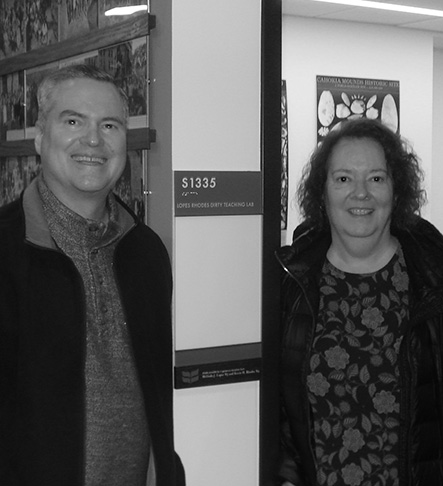Kevin Rhodes ’85 and Melinda (Lindy) Lopes ’85
HSSC ‘Dirty Lab’ will honor family’s Grinnell experience.

Lopes Rhodes Dirty Teaching Lab provides space for anthropology students to work with bones and artifacts
Kevin Rhodes ’85 and Melinda (Lindy) Lopes ’85 know about being dirty. The couple met on an archaeological dig near Flagstaff, Arizona, in the summer of 1984, a trip led by anthropology professors John Whittaker and Kathy Kamp.
Along with a dozen other Grinnell students, they spent six weeks digging and sweating at the College’s first field school, an ancient Native American village located 7,000 feet above sea level on public lands.
Though Rhodes and Lopes went on to careers outside anthropology, the couple – married 26 years and with three kids, including Emily Lopes Rhodes ’19 – jumped at the opportunity to give back to Grinnell’s Anthropology Department. The family has named the Lopes Rhodes Dirty Teaching Lab, located in the Humanities and Social Studies Center (HSSC).
The Dirty Lab is where anthropology students and faculty clean and process bones, artifacts and other specimens. The gift honors the family’s Grinnell experience – Emily participated in Grinnell in London with professors Whittaker and Kamp – and the lab will be utilized by the two professors who introduced Kevin and Melinda to archaeology.
“Having a dedicated Dirty Lab expands the teaching space and the experiences of students,” says Whittaker. “In Goodnow, pottery firing experiments, flintknapping (making flaked or chipped stone tools), preparing animal skeletons and the like took place in a cramped basement storeroom and hallways. We made it work, but a nicer lab space with facilities is far, far better.”
“We were looking for a way to give back to Grinnell and thought the Dirty Lab would be appropriate, since we met on a dig in Flagstaff, Arizona,” explains Rhodes, a patent attorney who is deputy general counsel at 3M Company in St. Paul, Minnesota. He and Melinda visited campus in February and were able to see the lab, which resembles a long kitchen with counters, tables for artifacts, sinks, and cupboards.
“Grinnell has been so instrumental in helping to make me who I am,” says Rhodes, who combined his anthropology major with a general science/chemistry degree. “Neither one of us remained archaeologists, but the foundations for critical thinking skills were there and sent me on a path to success, so we wanted to pay it forward to the students of today.”
For Lopes, who trained as a paralegal, then went on to earn a master’s in business, the lab was also a way to give back. “When I came to Grinnell, both my parents were teachers and didn’t have the means to fund my education. I was able to do that with scholarships and grants. Grinnell gave me the critical thinking skills I used in my career and educational pursuits afterwards.”
Lopes went on to work in HR/employee benefits consulting for PricewaterhouseCoopers and was administrative director of the Minnesota Waldorf School. She was amazed when she and Kevin got a tour from John and Kathy of the lab and the new anthropology space in the HSSC.
“I told John and Kathy ‘they should be so proud of what they built, and how they’ve grown the department and left it a better space.’ We’re really proud to be a part of that,” she says.
The Lopes Rhodes family may not be done with Grinnell degrees just yet. The youngest of Kevin and Melinda’s children, Caleb, may be interested in attending the College.
“We feel so very fortunate to have gotten our starts at Grinnell,” Lopes says. “It sent Kevin and me on a path that brought us together and opened up a lot of opportunities throughout our lives, so this is a way to say thank you to Grinnell from our family.”
The Dirty Lab is part of Grinnell’s World-Class Facilities, learning places that encourage student collaboration, creativity, and inquiry.
— by Anne Stein ’84